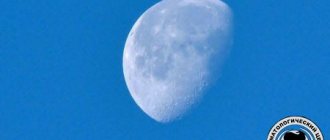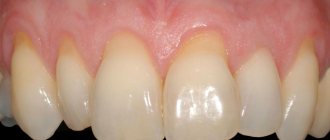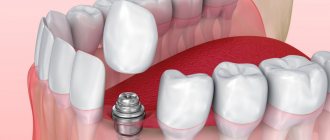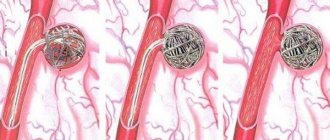What happens during the operation?
The operation takes 15-20 minutes and is painless. During the operation, the surgeon, through punctures in the cornea, using ultrasound and water, destroys and removes the clouded areas of the lens completely, and then through a thin tube introduces a soft transparent polymer lens into the eye, which takes its place there. No seams are used. This operation is called the “pearl of surgery.” But do not think that with such new technology, cataract surgery has lost its complexity. Therefore, the experience of the specialist who performs the operation is certainly important.
“THE MOON IS THE MOON, BUT...” That’s what both doctors and astrologers say
From time to time we receive requests to publish in the newspaper not only the weather forecast, but also lunar days. For what? It turns out that there are people who are trying to build their lives, plan events depending on what phase the Moon is in. We tried to figure out how pragmatic this is with the help of apologists for the “lunar” way of life and adherents of science or at least everyday facts.
Surprisingly, having combed the length and breadth of the Internet, we did not find any serious publications about the influence of the Moon on humans - neither from scientists nor from doctors. Except, of course, the information known from school about the ebb and flow of tides. By the way, a logical chain is built on this fact: since the Moon influences water, and a person consists mostly of liquid, it means that the Moon has an iron influence. The whole question is how much the lunar influence really affects our behavior and health. And this is where opinions differ.
Unlike scientists, astrologers write a lot about the influence of the Earth’s satellite on humans. All the information, all the lunar calendars, all the recommendations on what should be done on what day according to the lunar calendar, from planting potatoes to surgery, come from them.
Astrologers about the Moon
“The influence of the Moon is undeniable! Nowadays, no one doubts this,” they say. And they appeal to the doctor. True, all the time to the same thing - Hippocrates. Back in 460-377 BC, in his “Aphorisms” he spoke about the influence of heavenly bodies on human health.
Nowadays, from many sources you can find out: when the Moon begins to grow, a person feels a surge of strength, he is full of optimism, self-confident, ready to cope with any task. On the waning Moon, everything is the opposite: loss of strength, depression, desire to give up everything.
In this regard, astrologers advise starting a new business or its stages on the waxing Moon, and completing it on the waning Moon. The same applies to health: you need to start wellness treatments and prescribe active physical training at the beginning of the lunar month; its second half is a good time for cleansing the body (skin, digestive system, etc.).
In addition, the beginning of the waning moon is a time of female activity; men are very weakened at this time. On the waning Moon, the unconscious is activated; this time is good for creativity, but physical overload is contraindicated.
It is believed that the new moon is the calmest time, and the full moon is the most restless. During the full moon, there are spikes in suicides, an increase in crime, a decline in school performance, children are more capricious, and sleepwalkers walk around anxiously at night. Whether this is true or legends passed down from mouth to mouth is not known for certain. But many people believe it.
How can you not believe it? The third day I have a headache - and just on the waning moon. Mathematicians and physicists know that the coincidence in time of two events is not proof that one of them is the cause of the other. And the fact that belief in the danger of the full moon can act as self-hypnosis and provoke a deterioration in well-being is confirmed by psychologists and psychiatrists. Astrologers have a different point of view. Who to believe is a choice everyone makes for themselves.
About the “fifth house and its owner”
What does astrology say about surgical interventions?
On the waning Moon, astrologers believe, surgical intervention and injuries are dangerous, since the organs are full of blood and blood clotting is poor. Increased birth rate (due to the influence of the Moon on amniotic fluid) and mortality (due to the effect on blood).
Ancient astrologers, cited by modern ones, said: “It is not safe to intrude on the part of the body ruled by the sign through which the Moon passes.” And again they refer to Hippocrates, who left the following notes: “Do not touch with iron the part of the body governed by the sign that the Moon is now passing through.” That is, you need to take a closer look not only at whether the Moon is waxing or waning, whether it is full or just born, but also what sign of the Zodiac it is in.
Here is an example of their recommendations:
“Operations on the head, eyes and tooth extraction should not be carried out while the Moon is in Aries.
Throat operations, bloodletting, removal of tonsils, etc. should not be performed while the Moon is in Taurus.
Surgeries on limbs, amputations, etc. are not recommended in Sagittarius and Gemini.
Do not undertake operations related to hemorrhoids when the Moon is in Scorpio.
It is better not to operate on the hips and buttocks if the Moon is in Sagittarius, and on the knees and skin - when in Capricorn.
The medicine should not be given when the Moon is in a fixed sign, and if it is in Aries, Taurus or Capricorn, it may cause disgust and nausea in the patient. Taking a laxative should be done when the Moon and the lord of the ascendant are below the horizon.
The eyes should never be touched if the Moon is in earth signs or in conjunction, square and opposition to the Sun. Wait for the Moon to take a good position, increasing its light and freeing itself from affliction by the Sun or malefic planets.
The fifth house and its owner show whether a particular medicine is appropriate or inappropriate; the significator of a disease in a two-body sign suggests a relapse or transition of this disease to another.”
To be honest, it is difficult to imagine a modern person who would find out before taking a pill what the “significator of a disease in a two-body sign” shows. And how do you stick to all this?
But anyone who is passionate about this topic can easily buy a tear-off calendar at any bookstore, where everyone can be told what day the moon is today and what sign it is in. Probably, following the connection of your well-being and mood with the Moon in Aries or the Moon in Taurus is really interesting and informative.
To be fair, it is worth noting that astrologers themselves, although they give recommendations of this kind: “If you see that the doctor does not want to listen to your arguments about postponing the operation, then it is better to change the doctor and look for a more humane one. Finding a good doctor or healer is not a problem, they are everywhere,” they still take precautions. Just below their dubious advice you can read others: “If you had surgery at the wrong time, do not drive the fear program into your subconscious. Tell yourself: “The moon is the moon, but I believe in my strength and those who help me.” This way, you will achieve more than those who choose the right time for surgery, but are under the illusion that nothing bad can happen to them.”
A comment
Maxim Kuznetsov, trauma surgeon, Moscow:
- No, I do not believe and have not noticed that the moon somehow affects bleeding during injuries or operations. Maybe it influences something, but the size of the vessel has a much stronger influence on the volume of blood loss. If an artery is cut, there will be such a whiplash that you need to take emergency measures without looking at the moon. Even vessels of three to four millimeters cause large bleeding. As for operations, modern technologies are aimed at reducing blood loss. The anesthesiologist does not look at the moon, but before the operation artificially reduces the pressure - somewhere to 100/60, in order to reduce the blood pressure. In addition, the blood is checked for clotting, and if necessary, we use medications. In addition, the incisions are made so as not to damage large vessels, only small ones. Sometimes during surgery the patient loses only 150-200 ml of blood. I'm not saying that in normal clinics operations are performed with laser knives with simultaneous coagulation, where blood loss is generally minimal. If there is a need to cut larger vessels, for example, on the leg, and even in a large, full-blooded man, there will be a lot of blood in any case, sometimes up to one and a half liters, regardless of the phase of the moon. Here we keep blood substitutes ready. So operations have nothing to do with it. But if we are talking about scratches and small cuts, and not about surgery, then the bleeding really stops differently for everyone. It depends on blood clotting.
Full moon
There is an opinion that the so-called sleepwalkers especially react to the full moon; people who walk, can do something, and often talk without waking up.
But regarding the stories that they can walk along the edge of the roof with their eyes closed and not fall if you don’t wake them up, then all this in fact turned out to be just a story, as a rule, with reference to someone; none of the narrators saw this phenomenon with their own eyes. So let me classify this phenomenon as a legend.
Psychologists believe that this phenomenon does not pose any particular danger. At the same time, the full moon can create a certain background favorable for all kinds of deviations in behavior, but does not determine them completely. It may well be that excitable people, whose nervous system is highly susceptible to external influences, experience increased irritability during the full moon. They suffer from insomnia and become more prone to impulsive actions.
However, our survey yielded an interesting result: the attitude towards the Moon does not depend on the nervous system of people. Very calm, balanced people complained that they felt anxious during the new moon. But those who are more nervous and weather-sensitive, as a rule, do not notice the full moon at all, and if they do notice it, they consider it a beautiful natural phenomenon.
Selenology
Biorhythmology is a science that studies the patterns of biorhythms occurring in nature and humans. According to this science, all biological processes are subject to the cyclical influence of the moon, sun, planets, comets, and also depend on the gravitational, geomagnetic and other fields of our planet. All this affects our body differently. Then how to predict the total impact?
Scientists call the main synchronizer of intracellular biorhythms not the moon, but the change of day and night. Violation of these rhythms that are familiar to us - night-day, sleep-wake - is what leads to the development of diseases and the rapid “burning out” of the body. Therefore, in order to maintain a full, healthy state, it is necessary to strictly observe them: go to bed before 11 pm, wake up early in the morning, eat properly and on time.
At the same time, new directions have appeared in medicine that study biorhythms - chronodiagnosis, chronotherapy, chronopharmacology. They are all trying to study at what time a particular medicine or procedure should be taken for effective treatment. But let’s face it, practicing doctors never tie us to such biorhythms. It’s rare that a doctor will recommend a specific time when you need to take a choleretic drug and lie on your right side. Personally, I met it only once; others, apparently, do not believe in it.
But many do not deny the influence of climate on a person - his life and well-being, habits, performance. At the same time, scientists, like astrologers, begin with references to... Hippocrates. An ancient Greek physician noted that some people feel better in the summer, and some in the winter. A harsh and cold climate has a rather unfavorable effect on humans; soft and warm - can improve the overall resistance of the body and many processes in it.
The science that studies the effects of climate on humans is called climatology. Its theoretical foundations were created by such scientists as I.M. Sechenov, I.P. Pavlov.
Basically, climatic factors affect the heat exchange between a person and the external environment: the blood supply to the skin, the respiratory, cardiovascular and sweating systems. In cold weather, heat loss from the body is regulated almost exclusively by the dilation and constriction of blood vessels in the skin. In hot weather, the skin can lose heat from the body by producing sweat.
But scientists believe that many factors act on the human body at once. Moreover, the main effect is exerted by sudden, sharp climate changes. This is why many weather-sensitive people do not tolerate sudden changes in temperature. Scientists also include jumps in atmospheric pressure, a decrease in oxygen concentration in the air and the level of atmospheric pollution, and some include the degree of disturbance in the Earth’s magnetic field.
It is in winter during the cold season and especially with a sharp change in weather that cardiologists note an exacerbation of cardiovascular diseases. In one of the hospitals, a doctor complained that in the last frosty days of January, when the temperature dropped, unusually for the Moscow region, below 200 C, they had to discharge untreated patients and work like an emergency hospital: remove people from a serious condition and discharge them, because more and more new ones were being brought in there were no longer enough new patients, and there were no longer enough places.
The Siberian branch of the Academy of Medical Sciences conducted research, and the results showed: about 60-65 percent of chronic patients suffering from cardiovascular diseases feel a change in the weather: significant fluctuations in atmospheric pressure, air temperature, changes in the Earth’s geomagnetic field. Those suffering from cerebral atherosclerosis have a hard time enduring the invasion of air fronts that cause sudden changes in weather.
This also includes a deficiency of ultraviolet radiation in northern latitudes, which also has a detrimental effect on our health. And after all this wide range of negative factors affecting our well-being, do you still want to know on which day of the moon you should cut your hair, and on which day you should do an enema?
Reference
The lunar cycle is 29.5 days. During this time, the Moon returns to the same position in outer space relative to the Sun. In fact, the Moon makes a full revolution around the Earth in 27.3 days. But astrologers take into account the cycle of movement of the Moon relative to the Sun - 29.5 days.
The cycle consists of four phases. Each is equal to 7.4 days. Half of the day after 29 days is considered the thirtieth lunar day, and part of the day after the new moon is considered the first lunar day.
Waxing Crescent:
Phase 1 (1-7 lunar days), the beginning of the phase is the new moon;
Phase 2 (8-15 lunar days), the beginning of the phase is the first quarter.
Waning moon:
Phase 3 (16-22 lunar days), the beginning of the phase is the full moon;
Phase 4 (23-29, 30 lunar days), the beginning of the phase is the last quarter.
Voice of the people
Alexandra, cashier-accountant, 30 years old:
- I feel bad when the moon is full. And if I don’t close the curtains before going to bed so that there is no moonlight in the room, I can’t sleep. And if I don’t sleep well, then that’s it - I go to the window and see: the moon is full. At some point I realized that I generally feel bad when moonlight shines through the window.
Olga, accountant, 35 years old:
- No, I didn’t notice that the full or waning moon had any effect on me. I do not think about it. And I don’t associate my condition with the moon. I don’t even have thick curtains at home.
Victoria Alekseevna, director of the organization, 40 years old:
“I don’t believe it at all and I don’t feel anything.” I don’t even notice when she’s in the sky. I may randomly look up at the sky, see the full moon and say, “Oh my God, it’s so beautiful!” And if there are clouds in the sky, I don’t know whether it’s full or not.
Ivan Alekseevich, artist-photographer, 60 years old:
— I somehow didn’t think about it. I don’t notice any deterioration in my health depending on the lunar days. Fatigue, of course, happens. I know that pressure changes are bad for me. As for the full moon, on the contrary, look at it - amazingly beautiful!
Vera Petrovna, literature teacher, 72 years old:
- I know that I am a man of the moon, therefore I am subject to its influence. Once I found myself in a foreign city, and I had to undergo emergency surgery there. The full moon was unusual then - the Moon was abnormally close to the Earth. And I think she definitely provoked my operation.
Roman, engineer, 30 years old:
— When I see the moon, pleasant childhood memories arise. No depression, on the contrary, I want to take a walk under the moonlight.
What is sleepwalking
We call them lunatics according to the established cliche. In fact, this is not as rare a phenomenon as is commonly believed. Worldwide, according to official data, it affects about 2.5 percent of the population.
We interviewed several sleepwalkers. Tatyana K., starting from the age of four, got up at night, got dressed with open eyes and approached her mother, who had not yet gone to bed. “I’m getting ready for kindergarten,” she said. They undressed her, calmed her down, and put her to bed. In the morning Tanya didn’t remember anything. With age, the walking stopped, but she often jumped up at night and talked: she quickly babbled something in a language incomprehensible to those around her, was angry that they did not understand her, then fell asleep. And the next morning she couldn’t believe that she was talking in a semi-conscious state, she believed that she was being played.
Anya S. has been talking at night since childhood, always trying to tell something. She was also offended and nervous that she was not understood. "Yah you!" — in the end she said angrily and went to bed to get some sleep. Sometimes she walked in her sleep. The next morning she didn’t remember anything, but knowing from her mother’s words that this was happening, when she was a student she warned her friends to keep an eye on her. It was noticed that the nervous and excited atmosphere the day before provoked “sleepwalking.”
Elena S. also amazed her parents from childhood: she could leave the bedroom at night, with her eyes completely open, tell them that, for example, there was a giant spider living in the house, that she could see it. The next morning I described this “spider”. When I entered university, I surprised my dorm neighbors by jumping up and demanding that they understand her theory of the existence of electrons. She demanded discussion and was very offended when she was refused this.
The scientific name for sleepwalking is somnambulism. This term means sleepwalking and sleep-talking. It was called sleepwalking because of the strong opinion about the connection with the activity of the moon, in particular, the full moon. This opinion, experts believe, is erroneous, although they do not rule out that the moon does have some influence on the psyche of people.
If you look closely at such people, you will notice some features inherent in a somnambulist. Their movements are slow and smooth; although the eyes are closed, they do not perceive or hear anything. It is almost impossible to wake up a somnambulist. On average, they may experience such phenomena a couple of times a week.
Many people believe that sleepwalking is a rare mental illness. In fact, experts believe that this is not the case. Sleepwalking, they say, is a type of nervous disorder. Children and adolescents are more susceptible to this phenomenon. Our surveys have shown that women are more prone to it than men.
This problem only affects impressionable people. So if you're with an emotional person, don't be surprised if they tell you something at night. And in the morning he won’t remember about it. Remember: next to you is an emotional and, most likely, talented person with a fine mental organization.
But we need to keep an eye on sleepwalkers. It’s a good idea to get examined just in case; doctors will prescribe an encephalogram. It is possible that, they say, a focus of epileptic readiness may be found in the temporal lobe. The word epileptic readiness should not be scary; some neurologists say that most of us have it. But it is better to take this turn of events into account and, perhaps, take support courses.
In addition, sleepwalking in adults can be caused by stress, overwork, chronic lack of sleep, and high fever.
Sleepwalking in itself, experts say, is not dangerous. But sometimes a person can unwittingly harm himself, go outside and even fall out of a window. Therefore, you definitely need to keep an eye on him.
How can you help a sleepwalker? You can put bars on the windows or at least obstacles in front of them. Electrical wires, knives and other dangerous objects should not be left in sight. We must make sure that he cannot open the front door and leave the house in his sleep. Some people place a bowl of water in front of the bed, and once they get into it, they immediately wake up.
It is very useful to relax before bed: listen to light music, read a pleasant book or watch a movie. You need to fall asleep in complete silence, without disturbing your sleep pattern. And all will be well.
The brightest and largest Moon could be seen by the inhabitants of the Earth last night. The natural satellite came as close as possible to our planet, and this coincided with its full moon. The moon was 30 percent brighter and 15 percent larger in diameter.
Galina SEROVA
Newspaper "Forward"
After the operation, will I be able to see perfectly at any distance?
The patient immediately notices a significant improvement. With multifocal intraocular lenses, most patients do not need to wear glasses for 90-95% of their daily activities. This means that most patients with multifocal intraocular lenses can read, drive a car, watch TV, work on a computer, do makeup, and play sports without glasses. They are advised to have only one pair of glasses for small text or for reading in low light.
"Sputnik V"
This is the first coronavirus vaccine registered in Russia. It is recognized as one of the best vaccines in the world; this drug has passed all stages of testing and is recognized by the global medical community. Sputnik V is used not only in Russia, but also abroad. The vaccine has been registered in dozens of foreign countries.
The vaccine consists of adenovirus vectors that cannot reproduce. The coronavirus gene is embedded in their DNA, which the vaccine delivers to the body so that it gives an immune response.
Who can I bet on?
The drug passed three stages of clinical trials and was considered successful. Anyone over 18 years of age can be vaccinated with Sputnik V.
Contraindications for vaccination
It should not be given to those who have severe allergies. It is also worth waiting for recovery for those who have worsened chronic diseases. It is prohibited to vaccinate pregnant and lactating women, as well as minors under 18 years of age.
Interval between vaccinations
Sputnik V is given at intervals of 21 days between two doses.
When will antibodies appear?
Within three weeks after the second vaccination, antibodies will appear in the person’s body. The test will show them no earlier than on the 42nd day after the first vaccination.
How long does immunity last?
The developers of the drug guarantee that immunity from the vaccine lasts up to two years, taking into account data on other vector vaccines. Definitive data on antibody retention will be several years away.











